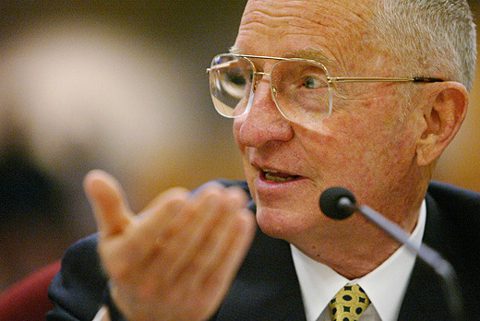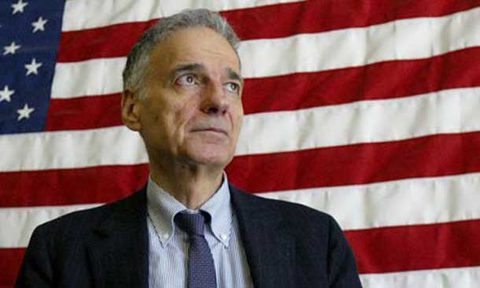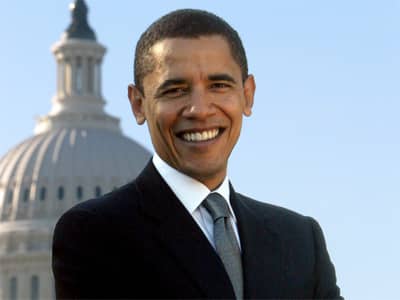
Marine One takes off from the White House lawn
What if Barack Obama’s poll numbers begin to lag? What if prominent black preachers or key Jewish leaders announce they cannot support him? What if it appears Obama is losing key swing states?
Will the President’s strategists began looking to conservatives to keep him in the White House?
Absurd? Well, don’t be so sure. Dissatisfied conservatives may be Obama’s magic bullet. In 1992, Ross Perot siphoned off enough conservative support for George H.W. Bush to put Bill Clinton over the top. Of 103,758,177 votes cast, 58,848,371 or 57 percent, went to Bush and Perot – compared to Clinton’s 44,909,806, a mere 43 percent. But Clinton won the White House.

H. Ross Perot
Why? The conservatives were divided with 39,104,550 for Bush and 19,743,821 for Perot. So, Clinton took the oath on Inauguration Day.
In 1996, Perot handed Clinton a second term. Had Perot supporters voted for Republican challenger Robert Dole, Clinton would have been defeated. He would have won the popular vote by the narrowest of margins, 47,401,185 to 47,282,763, but Dole would have won several key states’ electoral votes, such as Texas, to win 310 to 228 in the Electoral College, sending Clinton home to Arkansas.
Four years later, it was Clinton’s vice president, Al Gore, who lost to a third-party candidate, this time liberal Ralph Nader. Gore won the popular vote, but lost in the Electoral College. Had Nader supporters voted for Gore, the vice president would have won Florida and New Hampshire – and the presidency.
Ralph Nader
It’s not as if it hasn’t happened before. In 2008 Libertarian Party candidate Bob Barr siphoned off enough conservative votes in North Carolina to give that historically Republican state to Obama. In 1912, Theodore Roosevelt’s Bull Moose Party drew away hundreds of thousands of voters who would have supported incumbent William Howard Taft. With the Republican vote split between Teddy and Taft, Democrat Woodrow Wilson won with only 41 percent of the vote.
“Third party candidates can’t win, but they can continue to divide,” notes J.B. Williams of the website Conservative Crusader. So, don’t think that a third-party candidacy isn’t a vital part of election planning this time around.
“Most Americans have never heard of Virgil Goode, a former party-switching congressman with a distinctive Virginia drawl who conceivably could decide the presidential election,” writes Jim Kuhnhenn for the Huntington Post. “But he is well known to President Barack Obama’s team of political advisers.”
“Virgil Goode was a Democrat, an independent and a Republican before being nominated as the Constitution Party’s nominee for
president,” writes Robert Gehrke for the Salt Lake Tribune. “Come November, he could be wearing a different label: spoiler.”
Virgil Goode
It is in “Goode’s home state of Virginia where he could give the Romney campaign migraines,” notes Gehrke. “A recent poll by Public Policy Polling, a Democratic firm, said that if Goode qualifies for the ballot in Virginia, he could draw 9 percent of the vote, nearly all of it coming from Romney supporters.
“It could be devastating to the Romney campaign in a battleground state with 13 electoral votes that Romney will likely need in his column if he is to win the White House.”
“Within the Obama camp, he is considered one of two who could tilt the race by pulling votes away from Romney,” writes Kuhnhenn. The other is Libertarian Party candidate Gary Johnson, a former two-term Republican governor of New Mexico whose presence on the ballot could make a difference in the presidential contest in states such as New Mexico and Colorado.”
Together, Virginia, New Mexico and Colorado have 26 votes in the Electoral College. Winning any one of them would have won Gore the presidency. Denying Romney any one of them could keep Obama in the White House.
Mitt Romney
A senior Obama campaign official, speaking to the Associated Press on the condition of anonymity to discuss campaign thinking, pointed to polls that show Obama voters having greater enthusiasm for their candidate than do Romney voters. That means Romney voters could switch allegiance to Virgil Goode more easily.
"Goode is running for president on the Constitution Party ticket, and his candidacy has Republicans sweating," writes Elizabeth Diaz for Time magazine. "Goode is pulling fully 9 percent of Virginia’s vote, according to a mid-July Public Policy Polling survey, leaving Obama ahead of Romney 49 percent to 35 percent. In a tight election where Virginia’s 13 electoral college votes could make or break the Romney’s candidacy, even 2 percent for Goode could pull enough Republicans away to hand the historically red state to Obama in November.
Barack Obama
"Goode could easily maintain at least a few percentage points in Virginia through the fall. He remains a popular local figure who served
in the Virginia State Senate for 24 years and then then represented VA’s 5th district in the U.S. House until 2009," notes Diaz, who adds that Goode's message "appeals to many voters in rural, small-town Virginia. His Old Dominion charm is a break from a national race that can often seem impersonal. Goode remembers where his former constituents’ kids go to school, when their siblings moved to a nearby county, and how their family businesses have fared for the past two or three generations. He opens all his own doors -- and all doors for his staffers -- and makes sure that women enter first.
"He attends Pleasant Hill Methodist Church (though he’s Baptist) and spends his days on the trail at chicken festivals and gun shoots. To top it off, he narrowly missed giving a speech at a memorial dedication because he stopped en route to save a beagle who was hit by a truck -- he even paid a passerby to drive the dog to the vet before he continued on his way.
"He wants to eliminate foreign aid, issue a moratorium on 1.2 million green cards, and audit the Federal Reserve, writes Diaz. "Goode readily admits his odds of winning the White House are long."
His chances of giving Virginia's Electoral College votes to Obama -- and, hence, the presidency -- are far greater. Asked if he realizes his candidacy could re-elect Obama, Goode told Gehrke that could be a good thing – since Goode’s key issue is immigration.
“As Goode sees it,” reports Gehrke, “Romney could actually be worse on immigration than Obama. Goode said he’s convinced Romney would be soft on illegal immigration and could persuade Republicans to agree to pro-amnesty policies, where the GOP would fight Obama.”
“While many on the right fear that Constitution Party presidential candidate Virgil Goode might just draw enough votes in his native Virginia to tip the Old Dominion’s 14 electoral votes from Mitt Romney to Barack Obama, the former six-term congressman made it clear he doesn’t care,” reports Human Events political writer John Gizzi. “Goode, in fact, feels that ‘in many ways, for conservatives, it might be better to have Obama as president next year rather than Romney.’"
"In a national contest like this year's where Obama holds slight leads or is running virtually even with Romney in key battleground states," noted the Associated Press, "even a sliver of the vote in a crucial state could determine the outcome. Obama's team has scenarios whereby Obama can win in Virginia and Colorado with less than 50 percent vote with an assist from Goode and Johnson.
"That third-party candidates have become a consideration in Obama's camp illustrates one of the president's persistent challenges and his potential weakness: his inability to get above 50 percent in states he carried with some comfort in 2008."
Hence the Obama dream: That the dissatisfied will switch to third party candidates.
It worked for George W. Bush and Woodrow Wilson.
And twice for Bill Clinton.





